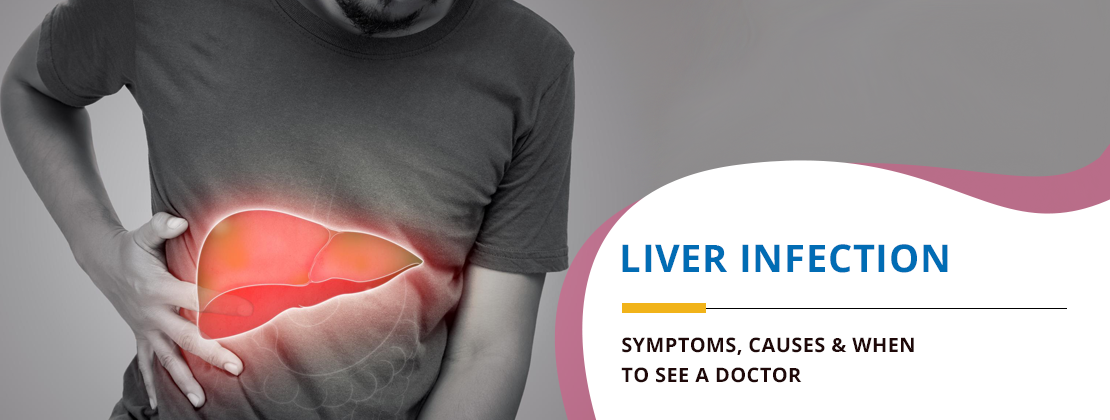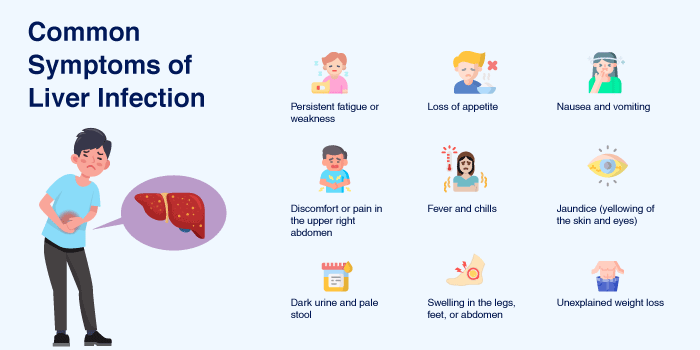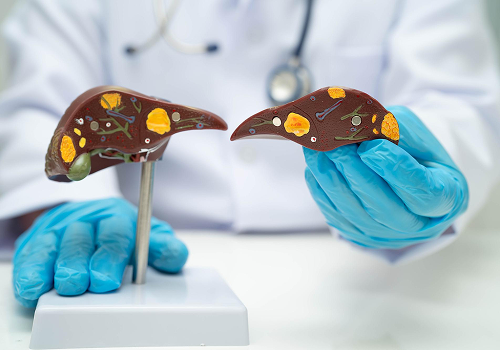
Home / Blog / Liver Infection: Symptoms, Causes & When to See a Doctor
Thanks to fitness influencers on social media, liver health is being discussed extensively in recent times.
Liver health, liver problems, and liver infections were rarely spoken about. It was thought to be an organ that never needed attention.
However, things have changed. More people are learning about how important optimum liver health is, how crucial it is to reduce infection risk, and what signs indicate liver problems.
In this blog article, we are discussing various aspects of a liver infection: what it is, its symptoms, its causes, and the treatments available.
A liver infection happens when viruses, bacteria, parasites, or fungi cause swelling or damage to the liver and affect how it works. This illness can either be severe, appearing quickly and ending after a short while, or chronic, lasting for many months or sometimes even years.
Liver infections can become worse and cause serious illnesses like cirrhosis, liver failure, or cancer. Most times, treating it early can help someone get better and improve their quality of life.
Several infections can compromise liver health. The most common types include:
This includes:
A liver abscess is a dangerous condition of the liver in which an accumulation of infected material leads to the formation of a cavity.
Parasites such as Entamoeba histolytica can lead to amebic liver abscess, especially in regions with poor sanitation.
This type of hepatitis occurs when the immune system wrongly destroys normal liver cells, causing long-lasting swelling and symptoms similar to those of infection.

Identifying liver symptoms early can be the key to timely and effective treatment. Common indicators include:
These symptoms may initially appear mild but can escalate quickly. It’s important to monitor your health and act promptly if you experience any of these signs.
Understanding what causes liver infections helps in both prevention and early diagnosis.

Being vigilant about these risk factors can significantly reduce the likelihood of developing a liver infection.
Knowing when to see a doctor for liver issues is crucial for early diagnosis and prevention of irreversible signs of liver damage. While some infections may resolve on their own, others can progress silently and cause severe complications.

Early consultation with a gastroenterologist can help initiate timely treatment and avoid unnecessary complications. The expertise and facilities available at the HCG Suchirayu Hospital, the best gastroenterology hospital in India, can make a significant difference in diagnosis and recovery.
To confirm a liver infection, doctors usually perform a series of tests:
These tests are often available at the HCG Suchirayu Hospital, the best gastroenterology hospital in India, where expert evaluation ensures accurate and timely diagnosis.
The choice of liver infection treatment depends on the cause, severity, and overall health of the patient.
For viral infections like hepatitis B and C, specific antiviral medications can suppress the virus and prevent liver damage.
Antibiotics are used to treat most bacterial infections and abscesses, but special medicines called antifungal agents are needed for the very uncommon fungal infections.
For parasitic infections, medications such as metronidazole are commonly used.
Supportive care for liver infection includes hydration, rest, proper nutrition, and avoiding liver-damaging substances like alcohol and acetaminophen.
A balanced diet, regular exercise, and staying away from junk food will assist the liver in healing and taking care of itself for a long time.
A liver transplant may be the only choice for some patients with severe liver disease. It is considered the final option in such cases.
For the best-quality care and support, especially in advanced cases, consider seeking help from an experienced gastroenterologist.
A liver infection is a disease that needs prompt attention and care to prevent life-threatening complications.
Recognising liver symptoms, being aware of the signs of liver damage, and knowing when to see a doctor for liver issues can significantly improve outcomes. If you’re experiencing persistent abdominal pain, fatigue, or jaundice, don’t hesitate to consult a specialist.
A qualified gastroenterologist at HCG Suchirayu Hospital, the best gastroenterology hospital in India, can offer you the care and expertise you need to recover and live a healthier life.